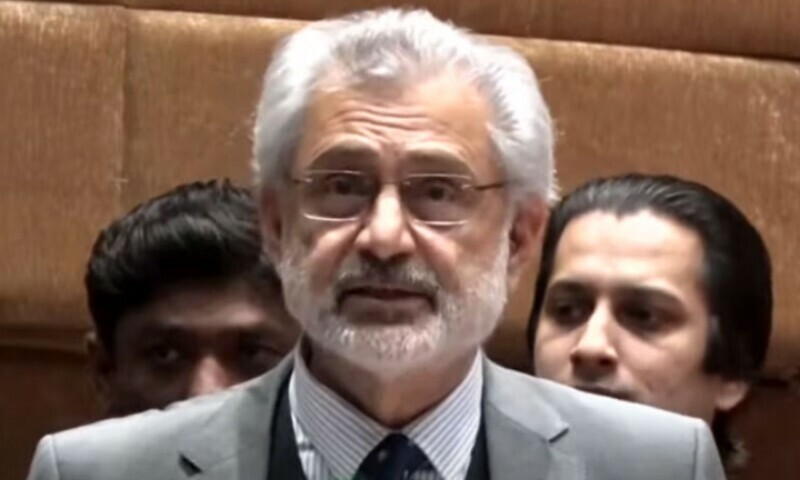• Matter involving 100 judges pending before council
• SC committed to providing information, says CJP Isa
• Politicians subjected to media trials, rues Justice Minallah
ISLAMABAD: Chief Justice of Pakistan (CJP) Qazi Faez Isa on Saturday revealed that he has sought opinion on complaints against 100 superior court judges which were pending before the Supreme Judicial Council (SJC) for quite some time.
Though the CJP did not name anyone, he said he had forwarded the complaints on misconduct to senior members of the SJC to consider and render their opinion.
Legal experts believe that such a large figure of complaints must have sent a chilling effect amongst the judiciary since the number encompassed almost the entire spectrum of judges from the Supreme Court and the high courts, many of whom may have retired by now.
The present SJC consists of CJP Isa, Justice Sardar Tariq Masood, Justice Syed Mansoor Ali Shah, Chief Justice Balochistan High Court Naeem Akhtar Afghan and Chief Justice Lahore High Court Muhammad Ameer Bhatti.
The CJP was speaking at the Second Law-Bridge Workshop on Superior Court Reporting, organised at the Asma Jehangir Auditorium.
‘Best disinfectant’
He used the forum to launch the Supreme Court of Pakistan Quarterly Report which covers a period from Sept 17 until Dec 16, 2023 by citing a popular saying of US jurists: “Sunlight is the best disinfectant,” and highlighted that Article 19-A of the Constitution grants the people the fundamental right to information and those paid by the public exchequer were accountable to people.
The CJP emphasised the SC was releasing the first quarterly report as part of its duty to better serve the people of Pakistan. The Supreme Court is now committed to providing information and making meaningful the fundamental right to information as provided in Article 19-A, he said.
According to the Supreme Judicial Council Procedure of Enquiry Rules 2005, when a complaint or information is received by the SJC, it is referred to a member of the council before initiating any formal proceedings to ascertain whether it was a fit case to be proceeded against.
Under Section 7 of Rules 2005, once any information in respect of enquiry into the conduct of a judge is received by any member or the council, it is presented to the chairman of the council, who then refers the same to any member of the council to look into the said information; and to express his opinion in relation to the sufficiency or otherwise of the information; (b) if the council is satisfied that the information prima facie discloses sufficient material for an enquiry, it shall proceed to consider the same“.
According to the rules, the member, to whom the chairman has referred the information, examines the same and ascertains if the information so received discloses specific particulars of misconduct, and provides factual details necessary to form, prima facie, opinion in respect of the guilt of the judge.
The CJP said SJC was required to attend to the accountability of judges under Article 209 and recalled that the last time it met was on July 2021. Subsequently, a large number of complaints requiring consideration had accumulated. He then convened a meeting of the council on Oct 27, 2023 to consider the pending earliest complaints in respect of which initial opinions had been given.
Consequently, 29 complaints were considered by SJC, of which 19 were dismissed by taking only 11 cases, 10 against now resigned justice Sayyed Mazahar Ali Akbar Naqvi and one against Justice Masood. The complaint against Justice Masood was later rejected. Justice Masood had also rendered his opinion on 10 complaints against Justice Naqvi.
The report explained that during a three-month period starting from Sept 17 to Dec 16, 2023, 4,466 cases were instituted while 5,305 cases were disposed of and 55,644 cases were pending by Dec 16.
Pendency of cases
The rising pendency of cases has remained a cause for concern for the general public, but they have not been granted access to the complete data in this regard since the Supreme Court record-keeping was first computerised in Sept 2012.
Later Justice Athar Minallah said the superior court judges were open to criticism, but those who criticise them should also have faith in the system.
He recalled how he was criticised for alleged WhatsApp contact with a popular political figure, but he chose to keep quiet instead of reacting.
This was not the first time since previously also he was accused of getting flats abroad when as the Islamabad High Court judge he granted bail to former prime minister Nawaz Sharif. But later the truth was revealed.
Justice Minallah also stressed the need for ensuring freedom of expression and said Pakistan was dismembered because there was no freedom of expression then. He said “we were not aware what was happening in the erstwhile eastern wing” since the inception of Pakistan.
Freedom of expression
According to him, freedom of expression came under attack when the Aug 11, 1947, speech of Quaid-i-Azam Mohammad Ali Jinnah was blacked out. Had there been freedom of expression, former prime minister Zulfikar Ali Bhutto could never have been sent to the gallows.
Justice Minallah lamented whenever a politician becomes weak, the entire system turned against him. Consequently, politicians were subjected to adverse media trial and condemned even before the verdict could be announced by the courts.
During the proceedings, former president PAS Tayyub Baloch requested the audience to observe one-minute silence in solidarity with those who lost their lives while doing their professional work in the wake of Israeli aggression against civilians in Gaza.
The workshop was jointly organised by the Press Association of the Supreme Court (PAS), Islamabad High Court Journalists Association, Supreme Court Bar Association, Directorate of Legal Pakistan Bar Council and Continuing Legal Education Institute of Pakistan.
Published in Dawn, January 21st, 2024







